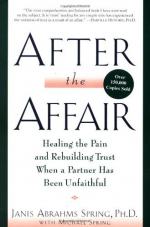
|
| Name: _________________________ | Period: ___________________ |
This test consists of 15 multiple choice questions and 5 short answer questions.
Multiple Choice Questions
1. A bulleted list is provided in Chapter 9 describing which aspects of forgiveness?
(a) Those experienced by the hurt partner.
(b) Those unique to each partner.
(c) Those needed to heal a marriage.
(d) Those integral to achieving full forgiveness.
2. According to scientific studies and contrary to conventional beliefs, how is forgiveness viewed for the individual?
(a) Necessary for emotional healing.
(b) Important for mental stability.
(c) Difficult to achieve.
(d) Not always good for them.
3. Developing realistic expectations of sex involves examining assumptions regarding which emotion?
(a) Lust.
(b) Passion.
(c) Love.
(d) Desire.
4. Listening to complaints does not equate to which behavior?
(a) Understanding.
(b) Forgiveness.
(c) Acceptance.
(d) Awareness.
5. Many people erroneously feel that their partners should be able to sense which of the following?
(a) Their needs.
(b) Their hurt.
(c) Their demands.
(d) Their frustration.
6. Which is an example of a behavior that may take a considerable toll on a partner?
(a) Allowing an inspection of credit card statements.
(b) Making daily telephone calls.
(c) Returning from work in a timely manner.
(d) Writing down detailed travel itineraries.
7. Couples often assume that sexual desire should be experienced in which way by each partner?
(a) With the same intensity.
(b) With the same duration.
(c) With the same fantasies.
(d) With the same frequency.
8. Women desire what type of support in communication?
(a) Mental.
(b) Emotional.
(c) Physical.
(d) Relational.
9. A listener should not engage in which action?
(a) Ignoring.
(b) Asking for clarification.
(c) Remaining silent.
(d) Arguing.
10. If the unfaithful partner is not interested in sex, the hurt partner may assume which possibility?
(a) A change in sexual desires.
(b) Their marriage is over.
(c) A lack of sexual ability.
(d) The affair is continuing.
11. According to Chapter 6, how can trust be restored in a person?
(a) Addressing the root causes of the affair.
(b) Changing personal behavior to display trustworthiness.
(c) Cutting off all communication to the lover.
(d) Recommitting fully to the relationship.
12. Children who did not express themselves growing up were often treated in which way by their parents?
(a) Told to be quiet.
(b) Told to behave.
(c) Told to sit down.
(d) Told to go to their room.
13. Post-affair testing for AIDS is described in which way?
(a) Too emotional to be discussed.
(b) Important for the lover.
(c) Optional for the unfaithful partner.
(d) Necessary for both partners.
14. If a childhood experience is missing from a person's life, the person will compensate with patterned, negative behavior referred to with which term?
(a) Void.
(b) Deficiency.
(c) Illusion.
(d) Schema.
15. Why are many individuals prevented from forgiving?
(a) They do not believe in forgiveness.
(b) They have wrong ideas about forgiveness.
(c) They feel they do not deserve forgiveness.
(d) They have unrealistic expectations about forgiveness.
Short Answer Questions
1. A hurt partner may believe their unfaithful partner is intentionally trying to achieve which task instead of changing for good?
2. Analyzing childhood experiences can lead to which result in a marriage?
3. When does the hurt partner mistakenly believe that the unfaithful partner must accomplish their personal change?
4. Intimate listening can be described as which skill?
5. Behaviors that build trust are divided in the book into two categories based on which factor?
|
This section contains 557 words (approx. 2 pages at 300 words per page) |

|




